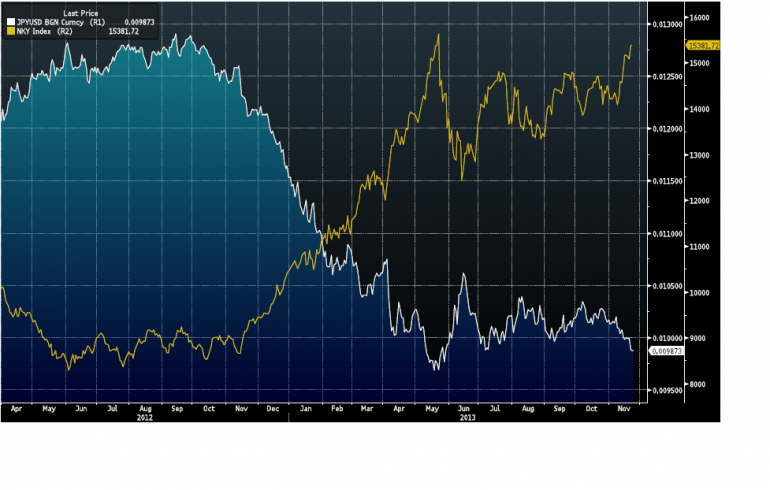Watch out for the currency wars
Developed markets, including Australia, have gained economic momentum and are expected to be the dominant share market performers over the coming year. However, when it comes to equity markets, it is eventually going to be a matter of separating currency devaluation from actual earnings improvement.
The Australian dollar has slipped 1.8 per cent since last Wednesday following Glenn Stevens’ speech declaring the Reserve Bank would consider intervention to move the currency lower.
Due to forceful monetary policy pursued in the developed world, it is becoming more apparent that equity markets can be a misleading indicator of underlying economic conditions. Let’s look at Japan – the Nikkei is up 64 per cent in 12 months but actual economic improvements have been considerably more modest.
The Japanese yen versus US dollar (white line) and the performance of the Nikkei 225 (yellow line) have become perfectly inverse. As the yen has weakened, the Nikkei has climbed.

Source: Bloomberg
A lower currency will only partially contribute to propping up equity markets. For the gains to be sustainable, corporate earnings must actually improve on drivers other than a weaker currency alone. A Credit Suisse report estimates the devaluation of the yen has not in fact provided a sizeable improvement to real net exports.
Recently, Robert Buckland, Citi chief global equity strategist, shared his thoughts on currency devaluation – it is a cop out. From an investment perspective, Buckland explains you will lose more on currency than is gained on the stock market. On this basis, it brings into question investing in foreign markets where active currency devaluation is prevalent.
As central banks move to providing more forward guidance, Glenn Stevens’ speech can be interpreted as Australia is getting serious about entering the global currency wars, especially if the RBA backs its words with actions.
Although Australia is significantly different to Japan when it comes to demographics, productivity and areas of expertise, stock market gains and currency devaluation are in fact translatable to the Australian market. A weaker currency may push the Australian equity market higher but it isn’t necessarily going to support bumper earnings from a lower currency.
The main theme emanating from central bankers at the moment is the quest for a price advantage in a bid to avoid deflation. Australia is now forced to play the game by taking steps to weaken the currency.
It seems like every western central bankers thinks their currency should be weaker. As more countries become active and step up devaluation efforts, it leaves fewer countries to be on the other side.
















